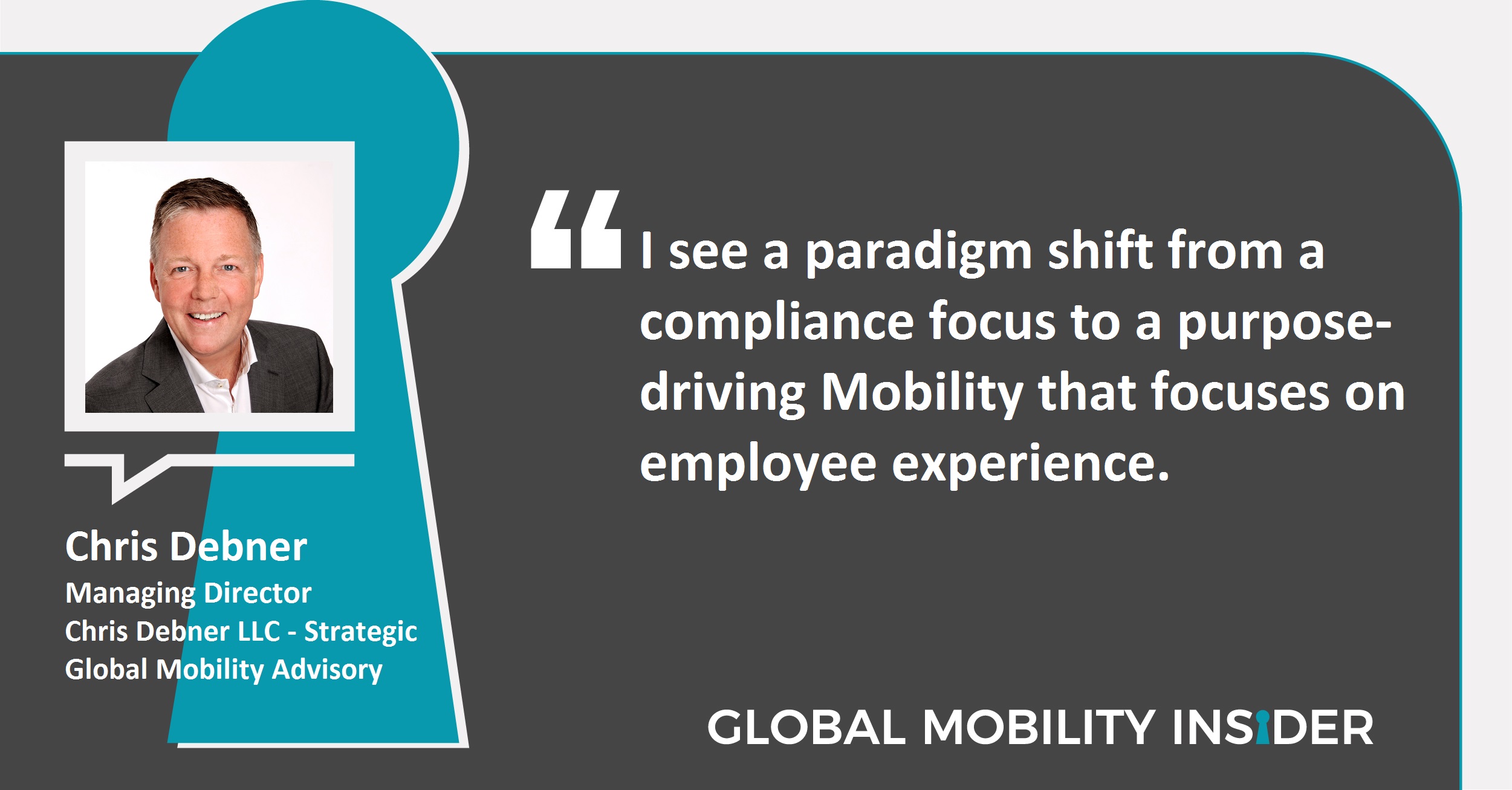Chris Debner – Founder and Managing Director Chris Debner LLC - Strategic Global Mobility Advisory LLC
Name: Chris Debner
Job: Founder and Managing Director
Company: Chris Debner - Strategic Global Mobility Advisory LLC

Professional Background
PSI Data Systems, (India) Executive Assistant to the CEO: 1997
Arthur Andersen, HR Consultant (Germany, Turkey): 1998-1999
Andersen, Senior HR Consultant (Czech Republic): 2000-2002
EY, Manager Global Mobility Advisory (Switzerland): 2002-2004
EY, Senior Manager: 2004-2012
EY, Executive Director: 2012-2015
Chris Debner LLC - Strategic Global Mobility Advisory, Managing Director: 2015-Present
Career Insider
Q: Can you tell us about why and how you switched lanes from Executive Assistant to Mobility Advisor?
I majored in Business Administration in Human Resource Management, and it happened that in my first job in India as an Executive Assistant to the CEO of a Software company, I was tasked with HR projects of streamlining the assignments of Indian software engineers and reducing the attrition rate. Since I liked what I was doing, it was a natural step to move into Mobility Consulting with Arthur Andersen. After 17 years of Big 4 experience in four countries, I decided to go do my own thing in 2015.
Q: Has your own experience as an expat contributed to your work in global mobility?
Absolutely, my experience has taken me from being a so-called “Local plus” in India, to a commuter between Germany & Turkey, to a long-term assignee in beautiful Prague and then finally in 2002 in Switzerland. All were priceless experiences that I can often relate to when talking to my clients.
Q: What keeps you going to work every day?
I am a driven person and my purpose is very close to my company’s purpose: “Supporting global mobility to help companies to improve the lives of their assignees and families, by helping them to develop strategies to overcome their challenges.” In addition, I am passionate about giving back the experience that I was able to gather in this area.
Q: What is 'business as usual' like for your company?
It’s a nice mix of activities that never gets me bored. I might give a talk to a Mobility audience somewhere in Europe, write a business case for change, teach at a business school or university, publish an article, facilitate a strategy workshop or mentor someone. And for my own development, I regularly meet and talk with business partners to exchange our views, read relevant publications and watch webcasts. And finally enjoy the time that is left over.
Q: What are you proud of achieving in your career and what's next?
There are three things I am very proud of. First and foremost is that three of my former team members at EY scored wonderful jobs in Mobility. Two of them are now Heads of Mobility for sizeable programs. The second thing is winning the 2015 Global Mobility Professional of the year award, after being awarded the 2012 Global Mobility Rising Star award. Thirdly, I managed to set up a network with the Heads of Mobility of the largest Swiss companies listed on the Swiss Market Index. Next in my career is to have more time and resources to be able to focus on educational and pro bono activities.
Q: If you weren’t in your position now, what do you think you would’ve done in life?
Something where I could pass on my experience to help organisations and people in achieving their potential.
Q: What advice would you give to someone looking to build a career in global mobility?
If you have ideally lived abroad, care for the wellbeing of people, like multidisciplinary work and challenges, you should give it a try.
Click & Like on LinkedIn
Industry Insider
Q: How do you think the global mobility Industry has changed over the years?
Over the past 20 years, I have seen constant change in Mobility. This is proven by the trends constantly evolving in Mobility, where the speed of change is increasing. The baseline of the change is that Mobility develops from an administrative function that was reactive to a strategic business partner that acts agile and pro-active.
Q: What aspect of global mobility is likely to keep you up at night?
I do sleep well, but to answer the question, it’s probably the risk that I see that too many companies not follow the trends and are stuck in remaining an administrative function. With the potential results of either becoming seen as a commodity (where purchasing picks your providers for you) being ordered to change from above, or becoming non-competitive leading to potential replacements of the mobility team. Mobility needs to break out of their silo and get involved with the business to earn their place at the top table.
Q: What's the one thing hindering the global mobility industry's progress in Europe?
I have identified three main barriers that keep Mobility Functions hindered to start the sometimes overdue transformations of their programs:
- Time and resources
- Skillsets
- Engaging with the business / getting top management attention
Creating business cases for change, making use of the evolving offers to develop Mobility Talent and moving out of their silos to engage with the business are feasible approaches to overcome these barriers. I know of several examples of companies who have managed especially the engagement with the business in very successful way by now.
Q: Can you name just one thing what Managers handling global mobility should consider first when considering a Mobility transformation?
If I had to settle on one thing, it would be to do some soul searching to see if there is a spark in you that ignites the will to change and to face the challenges. Without that spark, not much will happen.
Visionary Insider
Q: Your article about the “The New Flexible in Mobility” proposed an interesting approach to flexibility in the industry, what do you think industry leaders need to understand about this?
A mere focus of companies on their customers will not be enough for success in the future. In order to be successful, companies need to focus on their talent as well, and this talent demands more customized benefits, workplaces and positive employee experiences. It’s undisputedly the international assignment that will create the biggest impact on employee experience during an entire employee life cycle. So, it is key that Mobility addresses the topic of the New Flexible to create a positive employee/assignee experience.
Q: What more can be done to improve current global mobility practices to benefit talents on the move?
A focus on employee experience will certainly help, and looking at all processes that create such experiences and identifying where the experience can be enhanced and how. Some practical ideas are e.g. inclusion of the family addressing cultural and psychological aspects on the move, the use of technology to keep assignees informed, ensuring jointly with talent management that there is a meaningful job after repatriation etc.
Q: How have you managed to stay ahead of the game when it comes to strategic reforms for mobility programmes?
I am very privileged to have advised more than 100 companies in over 30 countries in Mobility matters in my career, and I see that as the basis of my experience. For future thinking, I prefer to look at Industry 2.0 and latest HR trends, and then try to figure what they might mean for Mobility. Surveys and majority of publications are often looking backwards into the history and if they look to the future they can spell out aspirations rather than making claims that can be proven. Otherwise, I come across a lot of experienced Mobility people through my work and I also read up some of the relevant technical publications.
Q: What are the developments you currently see in the industry?
The major development that I see is the paradigm shift from a compliance focus to a purpose-driving Mobility that focuses on employee experience. Compliance is a hygiene factor and needs to be treated as such. The purpose of a Mobility team needs to be re-discovered, creating a meaningful employee experience for their assignees and their families.
Q: Are you happy with these developments?
These days, we are seeing record low employee engagement numbers in surveys and at the same time an increase in the flexible workforce. Are they leaving their employers because they try to create their own purposeful job? I strongly believe that the orientation towards employees in general and the identification of a worthwhile purpose are positive developments.
Q: Do you think they’re ideal for the industry’s future?
I describe in my talks a future state of the Mobility function and prove it with the trends that lead there. Then, I show how a sound Mobility Strategy can achieve this future, and this future looks good.
Either/or...
-
Short-term assignment or Long-term assignment? Long-term assignment
-
Airbnb or Serviced Apartments? Airbnb
-
Excel or Global Mobility Software? GM Software
-
Lump Sum or Flex Ben? Flex Ben
-
Facebook or LinkedIn? LinkedIn for business, FB for friends
-
Outlook or Gmail? Outlook
-
Taxi or Uber? Uber
-
iOS or Android? BlackBerry Android
-
Mac or PC? Both
-
Computer or tablet? Both
-
Work hard or play hard? Play hard, work is play


Leave a Comment
* Fields marked with this asterisk are mandatory.